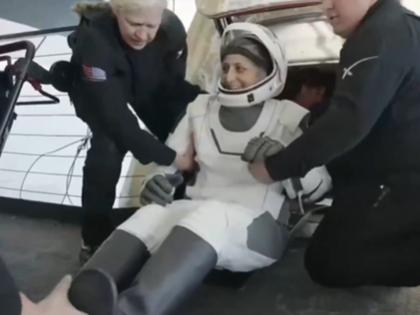Sunita Williams Returns to Earth: What Did NASA Astronaut Do in Space for Nine Months?
By Lokmat English Desk | Updated: March 19, 2025 08:04 IST2025-03-19T08:04:09+5:302025-03-19T08:04:18+5:30
NASA astronaut Sunita Williams has returned to Earth along with her colleagues after spending nine months aboard the International ...

Sunita Williams Returns to Earth: What Did NASA Astronaut Do in Space for Nine Months?
NASA astronaut Sunita Williams has returned to Earth along with her colleagues after spending nine months aboard the International Space Station (ISS). They successfully landed off the coast of Florida with the help of SpaceX’s Dragon crew-9 capsule. Williams initially arrived at the ISS on June 5, 2024, for what was supposed to be an eight-day mission originally. However, due to technical issues, the mission was extended, resulting in a nearly nine-month stay before their return on Wednesday, March 19 (IST). During this period, Williams contributed to several crucial space projects.
Maintaining the Space Station and Conducting Experiments
Throughout her time on the ISS, Williams played a vital role in maintaining and cleaning the space station, which is roughly the size of a football field. She replaced old equipment and participated in multiple scientific experiments aimed at advancing space research.
Record-Breaking Spacewalks
Williams and her team conducted over 900 hours of research and performed more than 150 experiments. Notably, she set a new record as the longest-duration female astronaut in space. She also spent a total of 62 hours and 9 minutes outside the ISS across nine spacewalks.
#WATCH | Being stranded at the International Space Station for 9 months, Sunita Williams is back on Earth with a smile
— ANI (@ANI) March 18, 2025
Today, NASA's SpaceX Crew-9 - astronauts Nick Hague, Butch Wilmore, Sunita Williams, and Roscosmos cosmonaut Aleksandr Gorbunov returned to Earth after the… pic.twitter.com/mdZIQTG4SN
Key Research Contributions
Williams was involved in significant research projects, including a study on how gravity affects liquid systems in space, which could contribute to the development of new reactors for water and fuel cells. Additionally, she participated in the Bionutrients Project, which focuses on using bacteria to produce essential nutrients—an initiative that could help astronauts receive fresh nutrients during long-duration space missions.
Williams' return marks another milestone in space exploration, reinforcing the importance of long-term missions in advancing scientific understanding and preparing for future deep-space travel.
Open in app